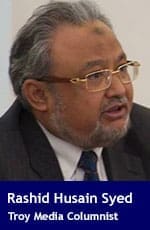Saudi Arabia requires US$80.90 per barrel oil if it is to meet its budgetary needs

A new sense of urgency is taking hold among some oil producers desperate to put a floor under the crude markets.
Over the last few months, OPEC+, which includes the OPEC oil-producing states and its allies including Russia, has made two output cuts.
Last October, OPEC+ opted to cut its crude output by two million barrels per day (bpd). The decision was taken despite desperate attempts by the Biden administration to stop them from doing so. With mid-term elections hardly a month away, the White House wanted the prices to stay low at next-door gas stations. It sent emissaries to Riyadh, the OPEC heavyweight, attempting to convince it to keep its crude taps open, at least until after the mid-term elections.
Its plea fell on deaf ears, and the output cut was announced.
 |
| Related Stories |
| Indigenous leaders make case for Canadian LNG
|
| Riyadh’s campaign for lower OPEC+ output clashes with Russia’s needs
|
| Global energy security should be a national imperative
|
Then, just a day before the early April 2023 OPEC+ meeting, while most were convinced that the group would roll over its output limits, the Riyadh-led OPEC announced a voluntary surprise cut of 1.16 million bpd in an attempt to tighten crude oil markets and keep a floor beneath them.
That move resulted in a price spike. Brent crude climbed as high as US$87 per barrel but has since given up the post-cut gains. Today it is loitering around $75 per barrel. In the meantime, U.S. crude dipped even below the US$70 mark.
Amidst speculation that OPEC+ might announce another cut, markets saw some strengthening late last week. Brent closed the week around $76 a barrel, with WTI trading just above $71.
Riyadh seemed determined to move crude oil market prices further up. Amid a spree of spending announcements in Saudi Arabia, the International Monetary Fund (IMF) says Riyadh needs a price of US $80.90 per barrel to meet its budgetary requirements.
It is that budgetary situation which has led Riyadh to urge its OPEC+ partners to squeeze crude supplies further, a tactic used to boost prices.
However, not everyone within OPEC+ seems to agree.
Russia, for instance, did not appear interested in getting the prices too high. It is satisfied with the current levels for one basic reason – the prices are not far off from the maximum price of $60 a barrel that the U.S.-led Western sanctions want Russian crude to sell at or below. Meanwhile, the United Arab Emirates is focused more on increasing its output quota to reflect its growing output capacity.
The two-day, seven hours long, in-person meeting of the oil ministers of the OPEC+ that finished Sunday was, therefore, contentious, according to reports. The talks dragged well into the night on Saturday and continued Sunday with a more than four-hour meeting of the alliance’s Joint Ministerial Monitoring Committee (JMMC), which recommends but does not implement policy.
Ultimately, a compromise was reached. Saudi Arabia announced a voluntary reduction of its July output by one million bpd, with the possibility of extending the cut if needed. However, whether this reduction includes the 500,000 bpd cut announced in April remains unclear.
For their part, the rest of the OPEC+ oil producers also agreed to extend their current cuts through the end of 2024. Russia also announced extending its voluntary oil production cut of 500,000 barrels per day until the end of December 2024, Russian Deputy Prime Minister Alexander Novak said on Sunday after the OPEC+ meeting.
Though the ultimate details of the size of the overall supply cuts by OPEC members are not available, Reuters reported that OPEC+ has lowered its oil output target for 2024 by 1.4 million bpd versus current output targets.
An exciting but uphill battle is on, between market fundamentals and OPEC+. In the ultimate analysis, though, market fundamentals will have the last hurrah.
Toronto-based Rashid Husain Syed is a respected energy and political analyst. The Middle East is his area of focus. As well as writing for major local and global newspapers, Rashid is also a regular speaker at major international conferences. He has provided his perspective on global energy issues to the Department of Energy in Washington and the International Energy Agency in Paris.
For interview requests, click here.
The opinions expressed by our columnists and contributors are theirs alone and do not inherently or expressly reflect the views of our publication.
© Troy Media
Troy Media is an editorial content provider to media outlets and its own hosted community news outlets across Canada.

